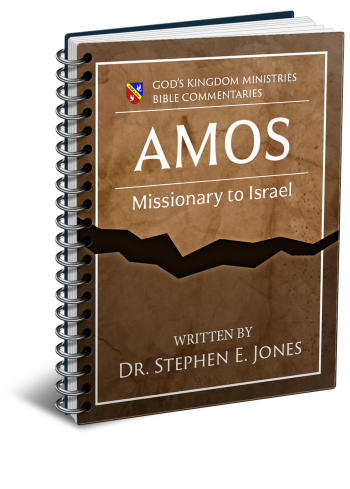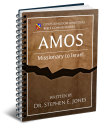Latest Posts
View the latest posts in an easy-to-read list format, with filtering options.

Amos was a missionary from Judah to Israel, giving them a final warning to repent before divine judgment was to destroy the nation. They refused, and two years later the nation was struck by a massive earthquake that destroyed their defenses and allowed the Assyrians to conquer them easily.
Category - Bible Commentaries

In Amos 8:5, 6 the prophet shows the lawlessness of society in Israel during his time. Then he says in Amos 8:7,
7 The Lord has sworn by the pride of Jacob, “Indeed, I will never forget any of their deeds.”
What is “the pride of Jacob?” The KJV renders it, “The Excellency of Jacob,” which is a reference to God Himself. The title “His Excellency” is a well-known title of respect that is used even today.
The fact that this title is used of God is clear from the fact that God “has sworn” an oath in this matter. Since He can swear on nothing and no one higher than Himself, it is often said that He has sworn by Himself, as in Amos 6:8.
What did God swear? “I will never forget any of their deeds.” In other words, He swore not to overlook their deeds but to judge them by His law.
The wording of this verse gives the impression that the sins of Israel would “never” be forgotten. That is actually not quite true, because the New Covenant states, “and their sin I will remember no more” (Jer. 31:34). Hence, Amos 8:7 must be understood in a more limited context. Holding their sin against them was not a permanent condition. It really meant that judgment would come without fail.
Amos 8:8 continues,
8 Because of this, will not the land quake and everyone who dwells in it mourn? Indeed, all of it will rise up like the Nile [yehore], and it will be tossed about, and subside like the Nile of Egypt.
This metaphor referred to the rise and fall of the Nile River every year when it flooded and then subsided. The word yehore was an Egyptian word that meant “river, canal,” but it was usually a reference to the Nile itself.
Even as the Nile’s flood came without fail and disrupted life in Egypt, so also will God disrupt the land of Israel when struck by a flood of divine judgment. The good news is that the flood always subsided later, implying that Israel’s judgment was to end at some point in the future. We might also note that yehore also means “light,” because its root is ore (ur), which is “light.” The Nile was figuratively the “light of Egypt,” making the land fertile as the flood deposited rich silt from upstream.
But the immediate threat was divine judgment that was to cover the land and cause the land to “quake.” No doubt this was the prophecy about the earthquake that was to occur two years later (Amos 1:1). After that quake occurred, the prophet viewed it as confirmation of his prophecy in Amos 8:8, marking the start of judgment.
There is also a greater fulfillment of this prophecy that applies to the lawless system of Mystery Babylon today. Rev. 16:18 speaks of a great earthquake that splits the city of Babylon into three parts. At the end of the present age will both the heavens and the earth quake in judgment, as ungodly governments are cast down to make room for the Kingdom of God. (See Hag. 2:6,7 and Heb. 12:26, 27.)
The latter-day quake prepares the way for the Kingdom of God, which is left standing in the midst of Babylon’s rubble. So once again we see something positive being implied in the midst of judgment and turmoil that is to come upon the world system at the end of the age.
Amos 8:9 says,
9 “And it will come about in that day,” declares the Lord God, “that I will make the sun go down at noon and make the earth dark in broad daylight.”
We have no record of a solar eclipse that can be taken as a sign of Israel’s judgment. However, many years later in the land of Judah, the sun went down at noon while Jesus was on the cross. Matt. 27:45 says,
45 Now from the sixth hour [noon] darkness fell upon all the land until the ninth hour [3 p.m.].
The rejection and crucifixion of Jesus ensured that the city of Jerusalem would soon be destroyed (in 70 A.D.).
Amos 8:10 continues the thought, saying,
10 Then I will turn your festivals into mourning and all your songs into lamentation; and I will bring sackcloth on everyone’s loins and baldness on every head. And I will make it like a time of mourning for an only son, and the end of it will be like a bitter day.
These were all customary signs of mourning at funerals in those days. So Jeremiah wrote his own Lamentations after the destruction of Jerusalem. Putting on sack cloth, sitting in dust and ashes, and shaving one’s head were well-known signs of mourning (1 Kings 21:27).
In the law, the priests were not allowed to shave their heads in mourning for the dead. Lev. 21:5 says,
5 They shall not make any baldness on their heads, nor shave off the edges of their beards, nor make any cuts in their flesh.
This shows that shaving the head was customary for most people, though not mandatory, and priests were forbidden to do it.
Amos likens this time of mourning to the loss of one’s “only son,” which seems to allude to the death of the only-begotten Son of God. This ties the threat of judgment to the feast of Passover, a time when the first-born sons of Egypt were killed, throwing the entire nation into mourning.
When Jesus was crucified as the Passover Lamb, God’s requirement was to use His blood to cover one’s “house.” By the law of sacrifice in Lev. 17:3-5, the animal could be killed anywhere, but its blood had to be brought to the place where God had placed His name in order to apply the blood to the soul of the one offering it.
The law said that if someone did not apply the blood, then that person would be guilty of bloodshed. Jesus was crucified outside the camp (Heb. 13:11, 12) on the Mount of Olives, but only those who treated His blood with respect, applying it to their “house,” could avoid being guilty of the body and blood of the Lord.
The Lord’s name at one time was located at Shiloh (Jer. 7:12) and later at the temple of Solomon in Jerusalem, but today His name is in our foreheads (Rev. 22:4). Hence, to fulfill the law, His blood must be applied spiritually to our own foreheads, which serve as the lintels of today’s “house” (Exodus 12:7).
To refuse to do this is the equivalent of the Egyptians refusing or neglecting to put the blood of the lamb on the lintels of their houses in the days of Moses. The result is the death of the first-born, which means that such people are not begotten by God. Without a New Creation Man, they are yet ineligible as sons of God.
There are two sets of festivals, one in the Spring and the other in the Autumn (northern hemisphere). The two sets parallel each other, and the second builds upon the first.
Passover is similar to the Day of Atonement. The wave-sheaf offering is similar to Trumpets. The seven days of Unleavened Bread run parallel to the seven days of the feast of Tabernacles.
Hence, just as Amos speaks of Passover being turned into a day of mourning, so also was the Day of Atonement known as a day of mourning. Mourning was a euphemism for fasting, and Atonement was a day of fasting and repentance.
The Day of Atonement was instituted when the 12 spies gave an evil report after spying out the land of Canaan for 40 days. They returned from their spying trip carrying the first-fruits of the grapes (Num. 13:20). A study of timing shows that this was the year 2450 from Adam, that is, the 50th Jubilee (50 x 49 years).
The people were supposed to celebrate the Jubilee of Jubilees that day, but their lack of faith turned the day from jubilation to mourning. This lack of faith is similar to what we have already shown in regard to Passover. Those who did not have faith in the blood of Christ as their Sacrifice for sin would remain guilty of bloodshed.
So the day of mourning was both Passover and the Day of Atonement insofar as judgment is concerned. The root cause of judgment on both days is lack of faith in Christ. Such a lack of faith turns the feast into “a bitter day” (Amos 8:10).